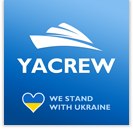Tips and advice for starting out in the Superyacht Industry
Mandatory Qualifications
It is mandatory that all vessels that take fare paying passengers on board are require their crew trained in STCW. Basically, this is a 5 day course which includes first aid, sea survival and fire training. Even private vessels will ask for this training as many often fall within the ISPS code. Training can be completed at the many training approved centres across the world so you would need to locate one a convenient for yourself.
You will need an ENG1 medical certificate, which entails a half an hour medial with an authorised doctor. A list of authorised doctors can be found on the UK MCA website.
All vessels that fall under the ISPS Code require all crew members to have successfully completed the relevant recognised security training courses. The minimum mandatory course being a (STCW ISPS) Proficiency in Security Awareness (PSA), a security awareness course, delivered in a classroom taking a minimum of 4 hours. If you have security duties you will require the (STCW ISPS) Proficiency in Designated Security Duties (PDSD) course, 8 hours. If you are responsible for the security of the vessel, you will need to complete the (STCW ISPS) Proficiency as Ship Security Officer (SSO) course taking 21 hours.
Your training must be taken at an approved training centre such as Skills 4 Security & Training who offer all the above UK Maritime & Coastguard Agency (MCA) security training courses.
Skills 4 Security & Training have also developed a specific eLearning course for all crew members, Superyacht Security Awareness Training Course which is CPD Certified. This allows easy access to learning any time in any place through the interactive learning portal.
Aimed specifically at the superyacht industry to add addition security training for all crew members building upon knowledge gained during industry standard STCW ISPS training, re-enforcing specific issues and taking a more in-depth look at the unique security requirements of Superyachts. CPD is and international recognition of learning and could enhance employment and career prospects.
Crew positions and opportunities can be highly competitive so it’s better to be well prepared and qualified.
If possible, try and get some work experience relevant to the type of posts you will be applying for.
Stewardesses
Stewardess jobs will be easier to find if you have worked in a restaurant or been in the hospitality industry. Silver service skills and bar tending may also be beneficial. Additional qualifications or experience such as a nurse or chef will always look good on your CV. If you are hoping for a stewardess job on a smaller vessel it may be a requirement to have boating skills as well. Day skipper motor or sail and PYA powerboat level 2 would be considered helpful.
Deckhands
Practical experience in any of the trades will be considered useful for a deckhand’s position.
Chefs
Chefs working on yachts will need culinary qualifications along with experience and good references.
Engineers
Engineers need to be able to demonstrate skills they possess that can be applied to many of the systems on a superyachts, which can be highly technical.
Refrigeration, electronics, navigation systems, mechanics, plumbing, engineering, carpentry may all be needed. A good engineering or mechanical qualification are highly sought after. Without to much experience and qualifications you may be advised to start as a deckhand and then progress up to a junior engineer. The MCA Approved Engineer Course is widely accepted for junior engineering positions or mate/engineer posts.
It may seem expensive to pay for all the training required now but also the costs of going to university and student loans don’t always guarantee a job position.
Training courses if nothing else, will teach you good life skills, introduce you to new people and friends as well as hopefully open up opportunities and to begin a career in an industry where you could get all your training expenses back very quickly if you work hard and are successful.
A good CV
Once you are planned, prepared, trained and have the skills and experience required, you will then need a very good CV to stand out to the crewing agencies and the recruitment teams onboard. The agencies are very helpful and their websites often give lots of great advice and information to help you write a good CV.
Apply for a job
There are many websites advertising crew positions but if you have good contacts of anyone already working in the industry, referrals could help too.
Often positions may not be advertised and are found by networking. Being in the right place at the right time is important. Many people start out by looking for work in the Mediterranean which means finding a crew house in either Antibes or Palma, networking and walking the docks. Being available for day work at short notice may be of help. Other popular hubs around the world are Antigua and St Maarten in the Caribbean in November and Fort Lauderdale in Florida, USA.
Research, prepare, network and be in the right place with the right qualifications and you could have the time of your life and earning plenty of money. Search for your security training course on skills4secuirty.com.
If you have any questions or wish any advice regarding security please feel free to contact us and we will endeavor to answer them as quick as possible.

 Navigating Love and Work: Challenges and Limitations for Couples Working Together on Superyachts
Navigating Love and Work: Challenges and Limitations for Couples Working Together on Superyachts 10 things nobody tells you before being a Yacht Stewardess
10 things nobody tells you before being a Yacht Stewardess The Unlikely Story of First Crewed Yacht Charters
The Unlikely Story of First Crewed Yacht Charters Is the yachting industry right for you?
Is the yachting industry right for you? Luxury Yacht Market Analysis 2019-2025
Luxury Yacht Market Analysis 2019-2025